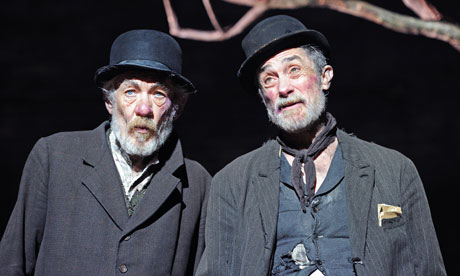
Once upon a time, the "avant garde" didn't refer to art at all. It denoted the horse cavalry, the riders and their mounts who led the charge into battle. But just as the theatrical avant garde really got going, in the late decades of the 19th century and the early ones of the 20th, the military one was being eliminated. (If you're wondering why, you might go and see War Horse.) Still, even though the term avant garde has been outmoded for nearly a century, it's precisely how many critics and academics – myself included – persist in thinking about the theatre. We speculate about what fresh spaces, forms and structures drama can charge into, and we worry that perhaps there's actually nothing new under the stage lights.
Of course, avant garde isn't the only term we employ. We also speak of theatre that's "edgy", "experimental", "radical" – terms that suggest the original and the forward-looking. But is meaningful innovation still possible? A few months ago, Lyn Gardner and other journalists wondered whether or not "underground theatre" was still a useful category, concluding that most "isn't subversive or experimental". Even the example of meaningful underground work she did discuss, a "dance of the dead" march in east London, recontextualises medieval forms of parade and pageantry. When I think of many of the questions in which I'm most interested as a critic – the relationship between actor and audience, between performance and life, between symbol and actuality – I wonder if earlier forms, such as the Athenian festivals or the early-modern court masques, haven't already supplied answers more radical than anything we might hope to achieve. At this point in the 21st century, are their really boundaries and battle lines left to breach?
Recently, I put together a piece for the Village Voice in which I asked some of off-Broadway's most ingenious producers, writers and directors whether or not they still found the idea of the avant garde useful, and whether the theatre could still move forward. First up, many disliked the term avant garde. Jay Scheib, an artist who works with very sophisticated technologies, claimed: "I'm personally inspired to be kind of derrière garde." Playwright Mac Wellman said: "I prefer to use the term 'experimental' rather than avant garde. But all theatre is experimental. I don't think the difference between avant garde theatre and mainstream theatre is that great."
Yet many felt that there were still ways the theatre could advance. Richard Foreman called for theatre that would "dare to put average audiences to sleep". For for those of us who feel a slight twinge that theatre is in the west so rarely a source of controversy, the monologuist Mike Daisey more confrontationally named several things he could do on stage that might start a riot – such as describing with obvious pleasure how he raped a child. Of course, as the playwright and performance artist Taylor Mac argued, perhaps the most radical thing we can do would be to "break our egomaniacal desire to be thought of as new".
Personally, I can't think of the last time I saw a show that really seemed truly new and boundary-breaking to me. I can think of scores that were provocative, joyful, inspired, transformative, and that's just as good as something new – better maybe. (Although, just for comparison's sake, I do wish I could have been around when Ghosts or Waiting for Godot first appeared on stage.) But more than I need new theatre, I feel the need of a new vocabulary to discuss challenging work. It's clear to me that many of our old terms just aren't relevant, and I'd welcome suggestions for fresh ones. So let's all try and charge forward linguistically. Giddyup!







